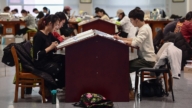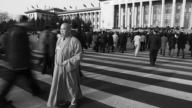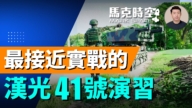【新唐人2013年05月14日讯】当前,大陆各地掀起了史无前例的城市化运动,30年中,有5亿人迁入城市,到2030年,中国城市人口将占全球人口的1/8。美国一位政治学者在研究近百个世纪的独裁政权后发现,城市人口高度集中在大都市的独裁国家,往往政权垮台的速度比平均水准快4年、垮台概率高60%。主要原因是,超大型城市会将大量民众聚集在一起,并使得民众更容易的组织起来,以及举行抗议活动。究竟中国城市化发展隐藏着哪些风险﹖下面请看专家的解析﹕
在《中国十亿城民:人类历史上最大规模移居背后的故事》一书中,长期生活在北京的记者汤姆米勒,深入考察中国在急于城市化的道路上误入歧途的原因。他认为,中国很大一部分经济增长受到城市建设推动,但是,当建筑活动在约20年后趋缓时,产生的风险就是:城市里充斥着庞大贫民窟。
分析说,真正令人担忧的是,在这些无序扩张的城市吸引到足够的市民后,城市所提供的生活质量将是低下的,这将促成分裂的社会,和无法兑现承诺的经济。
评论人士认为,城市化引发中国社会变革的可能性极大,农村人口和城市的中产阶级,都有可能成为引爆中国大规模转型的导火线,但哪一个会提前点燃,目前还是个未知数。
纽约城市大学政治学教授夏明:“从今年开始,中国已经50%以上的人口是生活在城市了,也就是说在中国也就是有7亿人口生活在城市里边,显然急剧的城市化过程,会带来许多的不稳定和冲突,城市化本身,它就会带来群体事件,甚至革命的可能行。”
夏明分析,随着网路资讯的日益发达和普及,越来越多的农民在观念和知识上发生巨大变革,新一代的农村青年不再以传统的种田为生,而是选择进入城市打工,加上与城市的联络越发频繁,今天的农民已经不是人们传统理解的那种愚昧、落后、知识封闭的人群。
夏明:“农民对外部世界生活的水准和生活质量的了解,同时对城市人口甚至国外的生活境况、他们权力和自由发展机会的了解,使得农民应该是有更强烈的自由的意识、法制意识和维权的意识。”
夏明指出,能够造成农村人民爆发的因素有两个,一是,中共当局对农民的残暴压榨和野蛮执法,二是,农民意识的觉醒。
经济时政评论家草庵:“民众的聚集就会让信息传播的更加通畅,而且更加有目地性。这会让他们对社会的文明制度和自己的权益认识的更加深刻,他们更愿意通过各种抗议实现自己的目标和理想。”
在中共当局大力推动城市化进程中,同样受到影响的第二大群体就是城市中产阶级。夏明指出,中国的中产阶级大部分是国家的公务员和专业人员,由于高度依赖国家政权,他们在过去的30年一直比较安静。但随着近年来中共不计后果发展经济、追求GDP,加上人口高度密集,越来越多的问题开始威胁到城市中产阶级。
夏明:“我们看关于环境污染、关于处置垃圾、关于有毒的或者有污染的各种项目的上马等等,还有关于高速公路或者高铁,还有像上海磁悬浮,这些工程对人体的影响,尤其是环保、生活质量问题,包括还有禽流感等等,都可能引发中产阶级的反抗。”
另外,美国俄亥俄州立大学(Ohio State University)的政治学者华莱士(Jeremy Wallace) 则对美国《华尔街日报》说,我确实认为中国领导人担心,城市失业问题会影响社会稳定,因为失业有可能破坏经济增长,并最终危及政权生存。
采访/刘惠 编辑/张天宇 后制/李月
China’s Urbanization Development with Constant Political Risks
Unprecedented urbanization is happening across China.
In the last 30 years, 500 million people have moved into cities.
By 2030, China’s urban population will account for
1/8 of the world’s population.
A U.S. political scientist held a study on countries
ruled by dictatorships in the past century.
The study found that dictatorship regimes with a concentrated
urban population often collapse four years faster than average,
and with a 60% higher probability to collapse.
The main reason is that mega-cities put people close together,
so it’s easier for people to organize and protest.
Let’s see what some of the experts have to say about the risks
hidden in China’s urban development.
In the book China’s One Billion City Population:
Story of the Largest Human Relocation in History,
reporter Tom Miller, who lived in Beijing for many years,
did an in-depth study of the wrong paths taken
in China’s rush to urbanization.
He believes that a large part of China’s economic growth
is driven by urban construction.
But once the construction slows down in about 20 years,
there is a risk of huge slums in cities.
The analysis says the real concern is after cities growing in an
unhealthy way get many citizens, their quality of life will drop.
It would result in a divided society,
and failure to fulfill economic commitments.
Commentators believe the possibility of social change
led by urbanization is very high.
Rural population and the urban middle class are both likely
to be the fuse of China’s large-scale transformation.
It’s unknown which one will be lit first.
Professor of Political Science Xia Ming at City University
of New York: “Since beginning this year, more than 50% of
China’s population lives in cities.
That means 700 million people in China live in cities.
It is obvious that the rapid process of urbanization
will bring instability and conflict.
Urbanization itself may bring mass incidents
or even revolution."
Xia Ming says that along with the increasingly
advanced and popular online information, more and more
farmers are going through tremendous changes
in their concepts and knowledge.
The new generation of young people in the countryside
no longer work as farmers.
They choose to work in cities instead.
With more frequent contact with the cities,
today’s farmers are no longer a group of people
known for ignorance, backwardness and introversion.
Xia Ming: “With farmers’ knowledge of the outside world
and the quality of life in the cities’,
as well as their understating of rights and freedoms,
farmers should have a stronger sense of freedom,
rule by law, and protection of their rights."
Xia Ming pointed out two factors that can
cause the outbreak of the rural people:
the first is the Chinese Communist Party (CCP) authorities’
brutal crushing of farmers and brutal law enforcement;
and secondly, the awakening of farmers’ consciousness.
Cao-An, economic and political critic:
“The gathering of people will allow more smooth
and purposeful dissemination of information.
This will give them a deeper understanding of
social civilization and their own interests.
So they will be more willing to realize their goals
through a variety of protests.”
The second largest group impacted by CCP’s
vigorous promotion of urbanization is the urban middle class.
Xia Ming pointed out that a majority of China’s middle class
is composed of government civil servants and professionals.
They are highly dependent on the state power.
In the past 30 years they have been relatively quiet.
With the CCP’s reckless economic development in past years
and high population density, more and more problems
begin to threaten urban middle class.
Xia Ming: “We see projects around environmental pollution,
garbage disposal, and highway or high-speed rail, etc.
These projects impact human health.
Issues around environmental protection, quality of life,
bird flu, etc., may lead to the revolt of the middle class."
Ohio State University political scientist Jeremy Wallace
told The Wall Street Journal that Chinese leaders are worried.
He says urban unemployment could impact social stability,
and that unemployment may undermine economic growth.
Which endangers the survival of the regime, in the end.






























